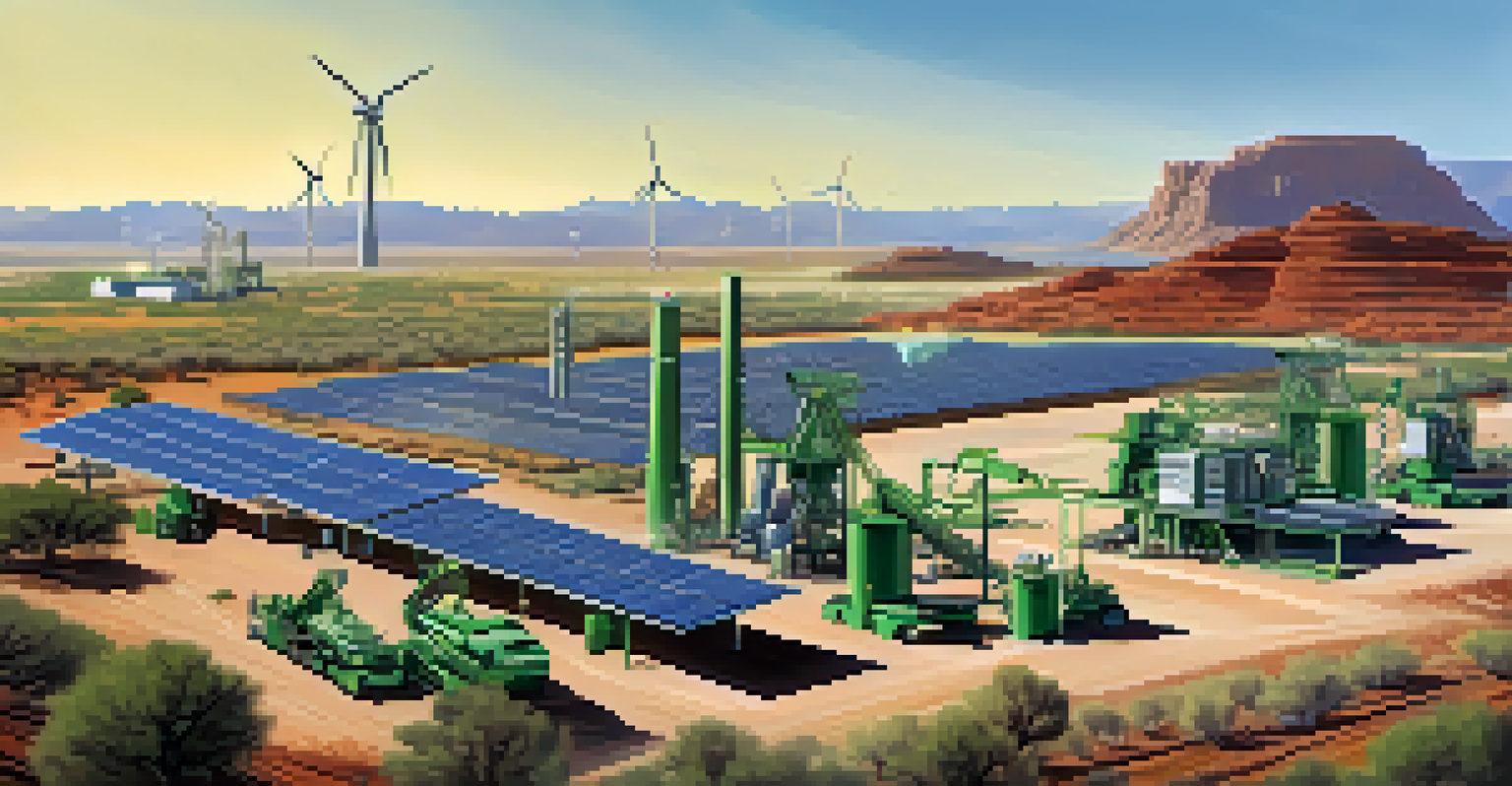The Role of Mining in Shaping Arizona's Economic Landscape

An Overview of Arizona's Mining Industry
Arizona is renowned for its rich mineral resources, making mining a cornerstone of its economy. From copper to gold, the state offers a treasure trove of materials that are essential for various industries. The mining industry not only provides raw materials but also fuels technological advancements and infrastructure development.
Mining is a cornerstone of Arizona's economy, providing essential raw materials and driving technological advancements.
Historically, mining has been a driving force in Arizona's growth, contributing significantly to the state's GDP. The legacy of mining is evident in the development of towns and communities that sprang up around mining operations. Today, Arizona is one of the leading mining states in the U.S., with a diverse range of minerals being extracted.
In recent years, the mining sector has adapted to modern demands, focusing on sustainable practices while continuing to meet the needs of consumers. This evolution reflects a broader commitment to balancing economic benefits with environmental stewardship, ensuring the industry remains viable for future generations.
Economic Contributions of the Mining Sector
Mining plays a pivotal role in Arizona's economy, contributing millions in revenue and creating thousands of jobs. The sector supports both direct employment in mines and indirect jobs in related industries like transportation and manufacturing. This interconnectedness highlights how mining serves as an economic engine for the state.

The revenue generated from mining operations helps fund essential public services such as education, healthcare, and infrastructure development. This financial support is crucial, especially in rural areas where mining is often one of the few major employers. As a result, mining not only boosts the local economy but also enhances the quality of life for residents.
Mining Drives Arizona's Economy
The mining industry significantly contributes to Arizona's economy by creating jobs, generating revenue, and funding essential public services.
Moreover, the mining industry has been proactive in investing in community development projects, further solidifying its role as a responsible corporate citizen. These initiatives not only provide economic benefits but also foster goodwill and strengthen relationships between mining companies and local communities.
The Evolution of Mining Technologies
Advancements in technology have revolutionized the mining industry in Arizona, making operations more efficient and safer. Innovations such as automated machinery and data analytics have streamlined processes, reducing costs and environmental impacts. These technologies allow for a more precise extraction of resources, minimizing waste.
The future of mining lies in balancing economic growth with environmental stewardship.
Moreover, the integration of renewable energy sources into mining operations is paving the way for a more sustainable future. Solar and wind energy are being harnessed to power mining equipment, reducing the industry's carbon footprint. This shift not only benefits the environment but also aligns with rising consumer demand for sustainable practices.
As the industry continues to evolve, Arizona's mining companies are also focusing on research and development to discover new methods and materials. This commitment to innovation ensures that the state remains competitive in the global market while also addressing environmental concerns.
Environmental Considerations in Mining
While mining offers significant economic benefits, it also poses environmental challenges that must be addressed. Land degradation, water pollution, and habitat destruction are some of the issues linked to mining activities. Recognizing these impacts, the industry is increasingly adopting sustainable practices to mitigate harm.
Regulatory bodies in Arizona enforce strict environmental guidelines that mining companies must follow to minimize their ecological footprint. These regulations ensure that operations are conducted responsibly, promoting the rehabilitation of mining sites after extraction is complete. This approach not only protects the environment but also ensures the longevity of mining as an industry.
Advancements in Mining Technology
Innovative technologies and renewable energy integration are transforming Arizona's mining sector, enhancing efficiency and sustainability.
Additionally, many mining companies are now investing in research to develop greener technologies and practices. This proactive stance not only demonstrates corporate responsibility but also enhances the industry's reputation among consumers increasingly focused on sustainability.
The Future of Mining in Arizona
Looking ahead, the future of mining in Arizona appears promising, given the state's vast mineral wealth and commitment to innovation. The ongoing demand for essential minerals, particularly for renewable energy technologies, is expected to drive growth in the sector. As electric vehicles and solar panels become more prevalent, copper and other minerals will be in higher demand.
Moreover, the state is positioning itself as a leader in sustainable mining practices, responding to both regulatory pressures and consumer expectations. By prioritizing responsible mining, Arizona can maintain its competitive edge while ensuring that economic growth does not come at the expense of the environment.
As new technologies continue to emerge, the mining industry in Arizona is likely to evolve in ways that enhance efficiency and sustainability. This adaptability will be crucial in navigating the challenges and opportunities that lie ahead, ensuring that mining remains a vital part of the state's economic landscape.
Mining's Role in Job Creation and Workforce Development
Mining is a significant source of employment in Arizona, providing jobs for thousands of residents. These positions range from skilled labor in extraction and processing to roles in management and engineering. The industry's demand for a diverse workforce has led to programs aimed at developing skills and training for local communities.
Partnerships between mining companies and educational institutions have emerged to create specialized training programs. These initiatives ensure that workers are equipped with the necessary skills to thrive in a modern mining environment, fostering career growth and stability. By investing in workforce development, the industry secures its future and supports economic resilience.
Commitment to Community Engagement
Mining companies are increasingly focusing on social responsibility and community involvement to build trust and improve local quality of life.
Furthermore, mining companies are increasingly prioritizing diversity and inclusion in their hiring practices. This shift not only enhances the workplace culture but also broadens the talent pool, driving innovation and productivity within the sector.
Community Engagement and Social Responsibility
Mining companies in Arizona are recognizing the importance of community engagement and social responsibility. By actively involving local communities in decision-making processes, companies can better understand and address concerns related to mining operations. This collaborative approach fosters trust and strengthens relationships between stakeholders.
Many mining operations invest in community programs, supporting local schools, healthcare, and infrastructure projects. These contributions not only improve the quality of life for residents but also demonstrate the industry's commitment to being a responsible neighbor. Such initiatives help to mitigate potential conflicts and enhance the company's reputation in the community.

Additionally, by promoting transparency and open communication, mining companies can build a positive narrative around their activities. This approach helps to combat negative perceptions and highlights the tangible benefits that the industry brings to local economies.